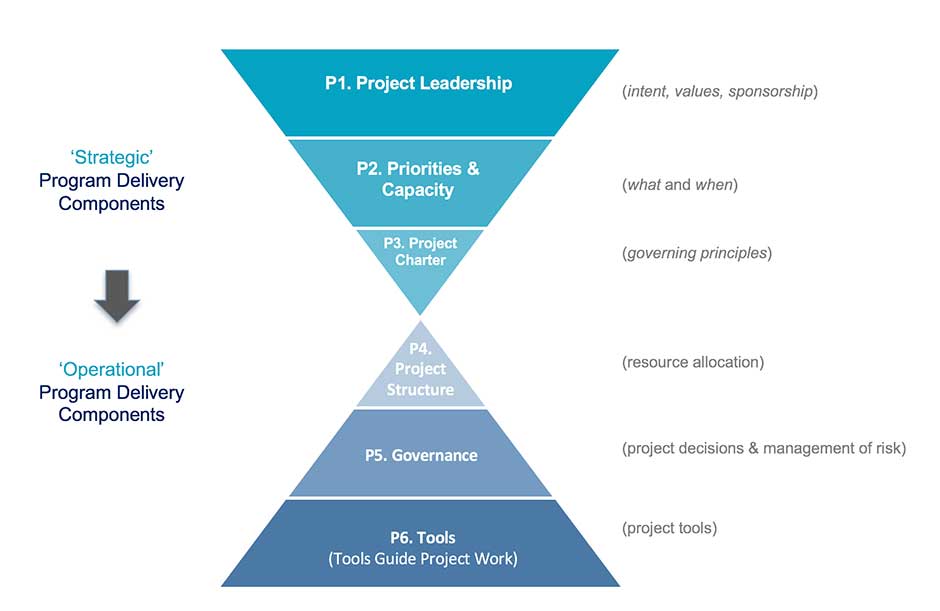What are the critical elements that should be non-negotiable for any transformation to succeed?
There is a real promise that comes with transformation. An organisation develops the strategy, gets board and executive buy-in, and then takes its first steps toward delivering on the vision. But it is those first steps that can confound many organisations.
Many dive into project delivery too early in the process and fail to hit the mark. Worse still, they will often jump into a portfolio of unrelated and uncoordinated projects that are managed by separate teams with no centralised view or unified direction.
It’s not uncommon to miss the critical transition stage of the PowerPoint-to-project journey, however, it’s a serious oversight when it occur because organisations skip over three vital non-negotiables for success:
- Establishing adequate strategic foundations for the transformation;
- Building a fit-for-purpose transformation management capability; and
- Capacity and capability to support strategic initiative execution.
Whilst executing through sound project management (PM) and delivery support are vitally important, setting up a transformation for success goes much wider. Transformational leadership, stakeholder management, strategic prioritisation, fit-for-purpose governance, and robust benefits realisation are fundamental to successful delivery.
Skipping the transition stage means that the three non-negotiables never get properly established. The transformational delivery model below highlights how these elements relate to successful delivery:

Figure 1: Transformational delivery model
So why are these so important?
Non-Negotiable 1: Strategic Foundations
Businesses need to ensure that all strategic initiatives are aligned with the ‘to-be’ vision, operating model, enterprise architecture and culture of the organisation.
They also need to de-risk the execution of the transformation program by establishing a clear vision, objectives, business case, metrics and resource model. This is also a critical pre-requisite for another element of transformation: Change Management
Non-Negotiable 2: Fit-for-Purpose Transformation Management
The successful management of transformation projects requires several specific capabilities, many of which are outlined above. We believe organisations should ensure there is a solid foundation in place on which to plan and manage the execution of the portfolio of strategic initiatives that will fundamentally transform the way the business operates.
However, in Quay’s experience of supporting organisations to set up transformation projects, there is almost always a significant challenge: A lack of confidence within Executive Teams that their organisation possesses the necessary capabilities to govern and manage transformational activities whilst controlling day-to-day operations as well.
So what are the questions that an organisation undertaking transformation needs to resolve before embarking on the transformation journey?
Transformation Project Leadership
- Is there a clear and granular understanding and commitment to the journey, its benefits, risks, resource requirements and impact on the organisation?
- Have we identified and scoped all the right initiatives?
- How do we create and sustain the right level of active executive sponsorship for all facets of the project?
Governance and Risk Management
- What decision making processes and risk management frameworks need to be put in place to proactively manage all transformational project risks and make timely and effective project decisions?
Benefits Realisation
- Given the critical importance of benefits capture, how can we establish the ‘benefits realisation’ discipline – without simply relying on complex financial models and spreadsheets?
Strategic Prioritisation
- Given the inevitable ‘uncovering’ of new opportunities along the way (and the importance of discipline), how does the program continually reassess priorities against both the strategic (top-down) vision and objectives of the transformation alongside the operational, day-to-day trade-off’s that will continually emerge?
Project Structure
- What is the optimal project structure that balances the need for clarity, business engagement and consistency with the need for agility and responsiveness?
- How can the organisational culture be harnessed here as a positive influence?
Project Delivery Tools
- What project tools (frameworks, guidelines, artefacts) fit best with the organisational DNA, complement the existing ‘ways of working’ and can co-exist with any existing project methodologies?
Transformation Capability Roadmap
- Given the above, how can the organisation most effectively establish these specific transformation delivery capabilities whilst building from the existing capabilities that are already in place?
Non-Negotiable 3: Strategic Initiative Execution
Our experience suggests that in addition to resourcing the delivery management capabilities in transformation, the execution of transformational initiatives will inevitably have a significant resourcing impact on any organisation’s business-as-usual activities. BAU has to be able to still function.
However, to execute the full range of strategic initiatives, additional resources are usually required.
As executives, senior managers and operational staff usually go through one transformation in a working life that makes bringing in the right capability with the right experience and – most importantly – cultural alignment, an imperative for success.
Most executive teams feel that they do not have sufficient in-house expertise to deliver transformation and that the right leadership can make or break high impact programs. Resourcing can be program-specific, but it may also be an opportunity to draw out internal talent and allocate operational staff to program teams and instead back-fill their operational position.
Start as you mean to continue
It is important that organisations consider these three non-negotiables before transformation programs commence in earnest to maximise the chances of success. Getting started on the correct path can often be the hardest part to get right.
We believe that quality thought leadership is worth sharing and encourage you to share with your colleagues. If you’re interested in republishing our content, here’s what’s okay and what’s not okay.
To speak to our team about how we can help your business deliver better projects, please contact us.

